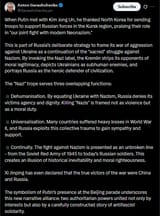https://x.com/Gerashchenko_en/status/1963566354310553754
When Putin met with Kim Jong Un, he thanked North Korea for sending troops to support Russian forces in the Kursk region, praising their role in "our joint fight with modern Neonazism."
This is part of Russia’s deliberate strategy to frame its war of aggression against Ukraine as a continuation of the "sacred" struggle against Nazism. By invoking the Nazi label, the Kremlin strips its opponents of moral legitimacy, depicts Ukrainians as subhuman enemies, and portrays Russia as the heroic defender of civilization.
The "Nazi" trope serves three overlapping functions:
◾Dehumanisation. By equating Ukraine with Nazism, Russia denies its victims agency and dignity. Killing "Nazis" is framed not as violence but as a moral duty.
◾Universalisation. Many countries suffered heavy losses in World War II, and Russia exploits this collective trauma to gain sympathy and support.
◾Continuity. The fight against Nazism is presented as an unbroken line - from the Soviet Red Army of 1945 to today’s Russian soldiers. This creates an illusion of historical inevitability and moral righteousness.
Xi Jinping has even declared that the true victors of the war were China and Russia.
The symbolism of Putin’s presence at the Beijing parade underscores this new narrative alliance: two authoritarian powers united not only by interests but also by a carefully constructed story of antifascist solidarity.
>part 1
